Developing education and health services for Iraqi children with Down syndrome
A mother and teacher describes how she developed a private school and clinic for children with Down syndrome in Baghdad and her work in founding The Iraqi Down Syndrome Association
Mustafa/Mansour. (2006) Developing education and health services for Iraqi children with Down syndrome. Down Syndrome News and Update, 5(2), 75-77. doi:10.3104/practice.369
Living in London
In 1983, I was gifted with a nice and pretty baby girl. At the time of her birth, I did not know that she was different from my other three children. It was only after three months that I discovered that she has Down syndrome. No one told me exactly what this was; they only told me that she would not be able to do anything for herself and she that would be retarded in every way. I was completely disappointed with the most important thing in my life, my child, and so from that time I became motivated to do everything I could for her. Without any information about Down syndrome, I was guided by the simple fact, that she is part of my heart.
We travelled as a family to London to enable my husband to study for a PhD in Engineering. We lived in London for five years from 1984 to 1989 and during this time I became a full member of The Down's Syndrome Association, UK. I visited their library many times and purchased a number of books about teaching children with Down syndrome. I also read many magazines articles about teaching through play and modeling.
Returning to Iraq
In 1990, we returned to Iraq, taking our nice and clever daughter, like a little flower who had grown so much during her time at school in the UK from 1984 to 1989. As you may be aware, under the previous government, Iraqi citizens were prevented from contacting people and organisations in the rest of the world and so I asked one of my friends in London to stay up to date with Professor Sue Buckley's work in the UK. One of my relatives also became a member of The Down's Syndrome Association, on my behalf and through this, I never stopped feeling and believing in the abilities of children with Down syndrome.
Before leaving London, I worked as a Head teacher in a secondary school for girls. When I came back, I did my best to transfer my skills through working at an institute for people with intellectual disabilities. I worked there with my daughter Hiba for nearly two years but I resigned in 1992 as I could not do as I wanted with these poor children. I found it was much better to work at home with my child. This is when I began thinking about building a private centre. Our house wasn't very big at the time but in 1993, my husband bought a big house in a nice area in Baghdad.
A dream come true
In 1993, my dream became a reality. I started my own school for children with Down syndrome. All the existing government centres are for people of all ages with all kinds of learning and mental health difficulties and they do not run education programmes, as they believe that these children are unable to learn.
The school was small in the beginning, with only four children and one other teacher, who I trained myself. By 1996, I had 25 children and seven teachers, again, each trained by me in how to work with the children. Our teaching is built on the foundation provided in the books published by The Down Syndrome Educational Trust. We followed the steps laid out in the booklets completely. In 2002, my kind husband developed the last section of our garden and built three more levels to accommodate enough classes for the 140 children, aged 2-27 years, who are now enrolled at The Hibato Alla Centre.
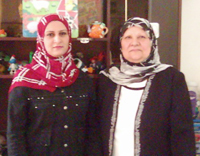
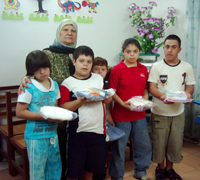

I now have 30 teachers working at the school and teach a full range of subjects including Arabic, mathematics, Muslim and Christian religion, science, English, computers, sport and vocational training. We train the children in everything which we believe is important for life, in addition to drawing and sewing. The pupils love to act and sing. They have a party every year where they do everything for themselves. They trained for one month and they did a wonderful job. They are dear, clever children. They love me as a mother and I love them all as my children. I started with just Hiba but who knows how many children I will have later!
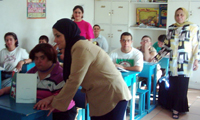
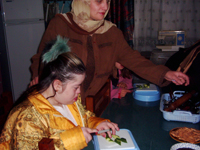
We also have a dental clinic at the centre and provide dental treatment for all 140 children free of charge as my daughter is a dentist. She loves the children and is happy to provide this service as a volunteer. The children love her very much and she works with them as friends.
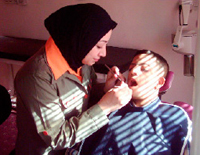
Her husband is a doctor and he monitors their health every month. The children start to arrive at 7.30 and start their first lesson at 8.45. We always start the day with sport in the yard. The children then have three one hour lessons. They go home at one o' clock in the afternoon, as the security is not good in Iraq and many of the children travel long distances to get to the school. We attend school for twelve months a year as I think it is better not to have a holiday, as the break may mean that the children start to forget their lessons. We have only Friday and Saturday as holiday each week.
The Iraqi Down Syndrome Association
In 1996 I tried in vain to get an official agreement for work to establish an Iraqi Down Syndrome Association. Finally, in 1999 I was allowed to start work with Iraqi families to help improve their children's development. There was no one else working in Iraq and so I talked with the families of the children at the centre and started to contact other national associations for information. I translate the information and organise a yearly conference to pass on my knowledge to everyone. Our conferences really are so good and important. I now have 500 members and they have elected me as Chairman of the Iraqi Association.
Before the war, I gave up a room in my house to the work of the Association. Now we don't have a place to have our meeting so I have decided to stop the work until I get an official place, and then I will start again.
December 'Buddy Walk'
On 2 December, 2005, the day of the Iraqi children with Down syndrome, I was joined by 200 friends and colleagues for our first 'buddy walk' to campaign for the rights of children with Down syndrome. We gathered at 8 o'clock in the morning and started walking at 10 o'clock till 12 o'clock. I made signs to tell the Iraqi people and the government about our rights. We shouted and shouted all the way about these rights and returned home safely, for it is a dangerous thing to go in these explosive roads, but we go for the sake of our children. We hope that this will become an annual event.
Buddy Walks
The first buddy walk took place in 1995, organised by The National Down Syndrome Society; these walks have become "the premier advocacy event for Down syndrome and a major platform for inclusion in communities across the country." To find out more, see www.buddywalk.org.

